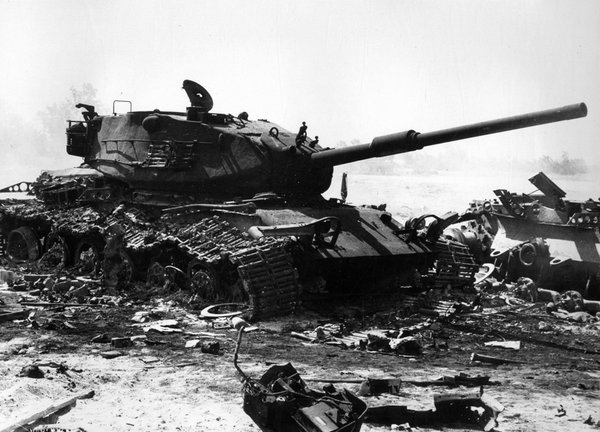
Rabbi Yehoshua Ben-Meir, the founder and head of Shvut Rachel yeshiva, shared his experiences as a young chaplain in the Israeli army during the Yom Kippur War. He was tasked with identifying and burying casualties from the war.
During the Yom Kippur War, I served as an army chaplain in an IDF division in the Golan Heights. It was a terrible war. The battles and the conditions were extraordinarily difficult. Every day we witnessed death up close.
We had been taught in the Mercaz HaRav yeshiva that the redemption of Israel is a process, one that grows and advances, progressing from strength to strength. But in this war, we experienced a sense of retreat. The blow was devastating, the pain was searing. In those trying times, I felt a tremendous need to examine and clarify my beliefs. I needed to understand how this bitterly fought war fit in the process of Israel’s redemption.
After two grueling months of combat at the front, with no showers, in extremely harsh conditions, I received a short leave.
I travelled straight to Jerusalem. The hour was late — two o'clock in the morning. But I urgently needed to speak with the Rosh Yeshiva, Rabbi Tzvi Yehudah Kook. I decided that I would first go to his house.
Hesitantly, I knocked on the door of his modest apartment on Ovadiah Street. The rabbi peeked through the peephole and immediately opened the door.
“Give me the document,” he said.
Apparently the rabbi was expecting some document from the army. I was so grimy and dirty, I figured he failed to recognize me.
“Rabbi — it’s me, Yehoshua Ben-Meir.”
“Yes, yes,” Rav Tzvi Yehudah responded. “Bring the document.”
I had no idea what the rabbi was talking about.
He took my hand, led me into his room, and sat me down on a chair. Again he insisted, “Show me the paper.”
“Rabbi, it’s me, Yehoshua Ben-Meir from the yeshiva.”
“Yes, I know. The document. Bring me the document.”
I was completely baffled. I still figured that the rabbi did not recognize me because of all the grease and dirt.
“Rabbi, what document are you talking about?”
“You have an agreement with God how the redemption of Israel is supposed to take place. And God changed the agreement. So show me the document. Let us examine what is written there, and we will decide.”
I heard the rabbi’s words, and — for the first time since the war broke out — I suddenly began to cry. Tears rolled down my face, releasing the pain and bitterness bottled inside, softening the grief and misery from the horrible events that I had witnessed.
I was amazed how quickly the rabbi had understood me. In those few seconds, from when he saw me through the peephole until I entered the room, he had identified my problem and known the solution.
The rabbi sat with me for a long time, maybe two hours. He took down books from the shelves. Before starting to study a text, he said, “Perhaps you have not learned this. And if you have, perhaps you did not review it. And if you reviewed, perhaps you forgot. Did we not learn...?”
The first book he opened was the Bible commentary of 13th-century scholar Rabbeinu Behaye. God sent Moses to Egypt to redeem the Israelites, but, at first, matters only got worse. Pharaoh imposed even harsher decrees upon the Hebrew slaves. And Moses complained to God, “Why have You made it worse for Your people? Why did you send me?” (Exodus 5:22)
Commenting on this verse, Rabbeinu Behaye noted that this phenomenon is not unique to the redemption from Egypt. The future redemption will also be accompanied by many difficulties, by times of darkness that will conceal the light of redemption.
The rabbi continued to open other classical texts — books of the Maharal of Prague, the Kuzari, the Midrash — reviewing various sources with me. After two hours of study together, I left his small apartment feeling renewed and fortified. I was armed with the spiritual strength I needed to carry on.
Rav Tzvi Yehudah had the extraordinary ability to sense the needs of each student. He could plumb the depths of your soul and provide the exact response you needed.
(Stories from the Land of Israel. Adapted from Mashmia Yeshuah by Simcha Raz and Hilah Volbershtin, pp. 357-358)





